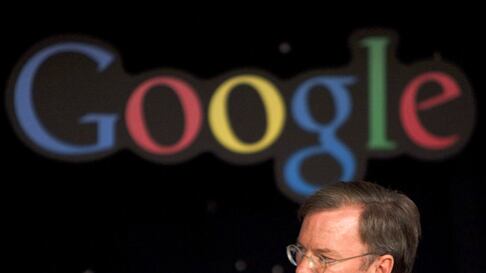
In the mid-1990s, magazines began to arrive with a shiny disc attached (silver, then gold, and then finally platinum) offering hundreds of hours of access to America Online that converted as many 30 million people into subscribers paying hourly and later monthly fees for the features on offer. AOL, as it came to be known, was so formidable that in 2000 it effectively swallowed Time Warner, one of the most glittering enterprises in global media and entertainment. The combined companies had a stock value of about $225 billion. AOL was a “suite” or “walled community” with content, services ( “You’ve Got Mail!”), and advertising. The bigger it got, the more customers and vendors began to complain about its business tactics. Customers that wanted to leave AOL found out that canceling the monthly fee was a headache. Would-be partners had to grovel for deals and were only accepted on onerous terms, they said. In only a few years, America Online had gone from welcoming to obnoxious.
Google CEO Eric Schmidt and others in the company reflect sotto voce a sense that whining and complaining about Google is the unjustified bleat of those on the downside of the Internet curve.
And then, poof, it was over. In what now seems like a nanosecond, AOL declined until it was synonymous with business failure and irrelevance. Its name, which once rode astride the corporate headquarters on New York's Columbus Circle, was ignominiously removed. Today, Time Warner is desperate to offload AOL. The Web site AOL.com (the America Online name was retired in 2006) is a perfectly respectable amalgam of news (its new PoliticsDaily.com) and fluff (photos of hair makeovers). It still charges for dial-up access, but it is essentially just another hodgepodge of stuff available elsewhere and without any particular brand cachet.
The history of America Online comes to mind because of the Google saga now unfolding. The rise, dominance, eclipse, and fall of infotech and Internet identities is a major part of the story of these past two decades. At various times, CompuServe, Prodigy, Netscape, MSN, Yahoo, among others, were in the spotlight, only to fade as Google brilliantly rolled out innovations and amassed resources that make it now far-and-away the most powerful presence in Internet culture—not a monopoly, but with many characteristics of one. The record shows that becoming so immensely successful and pervasive can be a last stage before significant countervailing pressures gather. AT&T until the 1980s, IBM and Microsoft in the 1990s, and AOL-Time Warner in the 2000s are examples of how expensive and corrosive regulatory and customer pushback can be.
Great companies endure. Microsoft is still the overwhelming force in software. Apple was down and is back up. AT&T is again a brand-name, probably because of the iPhone, as much as anything else. IBM is a central player in the computer business, even if what it does is very different from its former goods and services. But Google has reached a point where its search capacity is the core of so much commerce, information, and entertainment that resentment, resistance, and retribution are almost inevitable. Lately, the notion has taken hold that Google is at the forefront of ascendant enterprises making major money off content produced by others, who are themselves being battered in the transformation of where, when, and how news and entertainment are distributed.
Google CEO Eric Schmidt is starting to look and sound a little like America Online’s CEO Steve Case at his peak, in that he is widely visible to all and offering sundry assurances of the goodwill of his company, the generosity of its motives, and its continued commitment, in Google’s case, to the expansion of the creative and commercial offerings of the human race. At the same time, though, Schmidt and others in the company reflect sotto voce a sense that whining and complaining about Google is the unjustified bleat of those on the downside of the Internet curve.
I have followed with particular interest Google’s agreement last fall with book publishers establishing a system for managing digital availability of millions of books. My view is that this settlement of lawsuits filed by a publisher’s group and authors was a fundamental breakthrough that will assure a royalty structure going forward for digital books. But there is a counterargument that, by paying $125 million for the rights to scan these works and to set up the register for tracking revenue, Google effectively has taken over the future of books on the Internet, which gives the company too much power. This is a legitimate (and predictable) reaction to the settlement. But the response of Google’s spokesmen and lawyers in various venues has been patronizing to the critics, as if their fretting is unjustified and might just make matters worse in the long run.
This kind of dispute—which has expanded to the sharing of revenue from news made available through Google to aggregators—is bound to continue. The Internet is dynamic and things can change very fast. The cautionary message of America Online is that people were willing to pay billions of dollars for its output—and then they were not. Today, Google is the king of the mountain and, to the extent that it remains as nimble and innovative as it has been so far, it looks likely to continue that way. But arrogance and defensive pride can take a heavy toll on businesses and, whatever else it may be, Google is definitely as big a business as there is these days.
Peter Osnos is a senior fellow for media at The Century Foundation. Osnos is the founder and editor at large of PublicAffairs Books. He is vice chairman of the Columbia Journalism Review, a former publisher at Random House, and was a correspondent and editor at the Washington Post.






